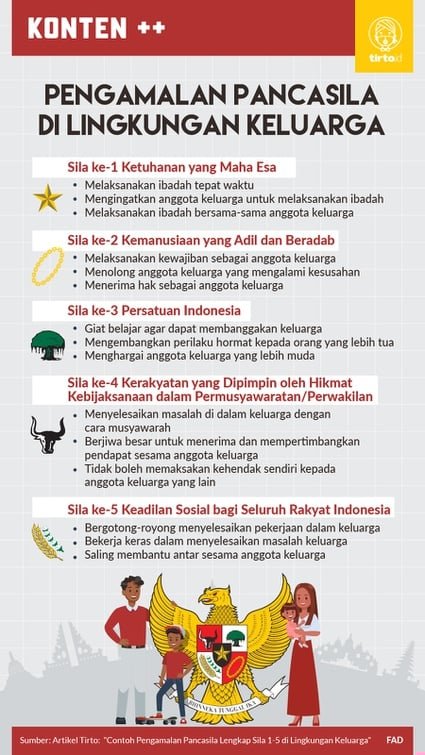
Pancasila serves as a guiding principle for many aspects of life in Indonesia, and its application in daily routines can be quite profound. Essentially, it embodies values like mutual respect, social justice, and a commitment to democracy. To dapat menjelaskan bentuk pengamalan pancasila dalam kehidupan sehari-hari, one can start by observing how these principles influence interactions in communities and workplaces.
Incorporating Pancasila into everyday life fosters a spirit of unity and cooperation. Simple acts, such as helping neighbors or participating in community events, reflect its ideals. By understanding and practicing these values, individuals can contribute positively to society while honoring this fundamental philosophy.
dapat menjelaskan bentuk pengamalan pancasila dalam kehidupan sehari-hari
Pancasila is the philosophical foundation of the Indonesian state. It serves as a guide for the country’s citizens, reflecting the nation’s core values and ideals. Understanding how Pancasila applies to everyday life is vital for fostering a sense of unity, tolerance, and respect among the diverse population of Indonesia. This article will explore the various forms of practicing Pancasila in daily life and provide examples that demonstrate its relevance in today’s society.
Understanding Pancasila
Before diving into the practical applications of Pancasila, it is crucial to understand what it entails. Pancasila consists of five principles:
- Belief in the One and Only God
- Just and Civilized Humanity
- The Unity of Indonesia
- Democracy Guided by the Inner Wisdom of Deliberation Amongst Representatives
- Social Justice for All Indonesia People
Each of these principles holds significance and shapes the way Indonesians interact with each other and their environment. The values embedded in these principles guide individual behavior and foster harmony within the community.
Practicing Belief in the One and Only God
The first principle of Pancasila emphasizes the importance of faith in God. In everyday life, this can manifest in various ways:
Daily Religious Practices
Many Indonesians incorporate their religious practices into their daily routine. This includes:
- Daily prayers and rituals that reflect their faith
- Participating in community worship services
- Observing religious holidays and ceremonies
Such practices reinforce a person’s spiritual connection and strengthen the community’s bonds.
Respecting Religious Diversity
Indonesia is home to numerous religions and beliefs. Practicing the first principle of Pancasila also means showing respect for others’ beliefs. This can be demonstrated through:
- Engaging in interfaith dialogues
- Participating in or attending religious celebrations of different faiths
- Promoting religious tolerance in schools and workplaces
These actions contribute to a more harmonious society where everyone feels valued and respected.
Embodying Just and Civilized Humanity
The second principle of Pancasila highlights the importance of dignity and respect for all individuals. In daily life, this principle can be practiced in the following ways:
Cultivating Empathy and Understanding
Building empathy involves recognizing and understanding others’ feelings and experiences. This can be encouraged through:
- Listening actively to others’ concerns
- Volunteering for community service projects
- Offering support to those in need, regardless of their background
These actions promote a culture of compassion and kindness within the community.
Promoting Gender Equality
Another way to embody this principle is by championing the rights of all individuals, particularly marginalized groups. This includes:
- Advocating for women’s rights and equality in the workplace
- Encouraging inclusive policies and practices in schools and organizations
- Addressing discriminatory behaviors and stereotypes
By working towards equality, individuals can ensure that everyone is treated justly.
Fostering the Unity of Indonesia
The third principle emphasizes national unity. Practicing this principle in everyday life can be done through:
Participating in Community Activities
Community engagement plays a crucial role in promoting unity. Participating in local events such as:
- Festivals celebrating cultural diversity
- Clean-up drives or community service projects
- Sporting events that encourage teamwork
Such activities foster relationships and a sense of belonging among community members.
Promoting National Pride
Being proud of one’s country can also manifest through:
- Learning about Indonesian history and culture
- Supporting local products and businesses
- Engaging in national commemorations and celebrations
These actions cultivate a strong sense of unity and shared identity among all citizens.
Engaging in Democracy Guided by the Inner Wisdom of Deliberation
Democracy is a civil duty in Indonesia, and practicing this principle involves:
Participating in Elections
It is essential for citizens to be actively involved in the democratic process by:
- Voting in local and national elections
- Educating themselves about candidates and policies
- Encouraging others to vote and respect their choices
Being an informed voter contributes to a healthy democracy.
Encouraging Open Dialogue
Deliberation often requires open communication. Ways to promote this include:
- Creating forums for community discussions on important issues
- Listening to diverse opinions and ensuring everyone’s voice is heard
- Promoting peaceful protests or campaigns for change
Such dialogues build trust and understanding, strengthening the democratic process.
Social Justice for All Indonesian People
The fifth principle of Pancasila embodies the need for social justice. In everyday practice, this can take form through:
Advocating for the Underprivileged
Working towards social justice involves:
- Supporting policies that benefit low-income communities
- Volunteering at local shelters or food banks
- Raising awareness about social issues through activism
These contributions help to elevate those in need and foster a more equitable society.
Creating Inclusive Environments
Another essential aspect of social justice is creating spaces where everyone feels welcome and valued. This can involve:
- Promoting diversity in schools and workplaces
- Developing programs that support marginalized groups
- Ensuring accessibility for people with disabilities
By advocating for inclusivity, everyone benefits from a supportive community.
The Role of Education in Practicing Pancasila
Education plays a crucial role in instilling the values of Pancasila. This can be achieved through:
Integrating Pancasila into School Curricula
Schools should incorporate Pancasila teachings into their lessons, which can include:
- Teaching students about the importance of unity and diversity
- Encouraging community service as part of school activities
- Facilitating discussions about democracy and civic responsibilities
These teachings help create informed and responsible citizens.
Encouraging Parental Involvement
Parents can help reinforce the principles of Pancasila at home by:
- Encouraging children to engage in community service
- Discussing moral values and ethical behavior
- Promoting respectful discussions about different beliefs and opinions
By fostering these values early on, parents contribute to a society that values Pancasila.
Using Technology to Promote Pancasila Principles
In the digital age, technology can play a significant role in promoting Pancasila values. This can include:
Social Media Awareness Campaigns
Individuals and organizations can utilize social media to:
- Share stories that exemplify Pancasila values
- Encourage discussions about social justice and equality
- Promote events and initiatives that align with Pancasila principles
These campaigns can reach vast audiences and inspire action.
Online Platforms for Education and Dialogue
Various online resources can enhance understanding of Pancasila, such as:
- Creating blogs or forums dedicated to Pancasila discussions
- Offering online courses about Indonesian history and principles
- Hosting webinars or virtual meetings to discuss Pancasila’s relevance today
Leveraging technology can help educate and engage people more effectively.
Through everyday actions and practices, the principles of Pancasila can become an intrinsic part of Indonesian society. By integrating these values into daily life, individuals contribute to the nation’s unity, justice, and democracy.
Pancasila offers a profound framework to guide the behavior and attitudes of Indonesia’s citizens. By actively practicing its principles in various aspects of life, people can work together to create a harmonious and just society, celebrating both their individual identities and their collective responsibility as members of the Indonesian nation.
PENERAPAN NILAI-NILAI PANCASILA DALAM KEHIDUPAN SEHARI-HARI | BUTIR-BITIR #PANCASILA
Frequently Asked Questions
How can individuals practice the principles of Pancasila in their daily interactions?
Individuals can embody the principles of Pancasila by treating others with respect and dignity, regardless of their background. This means engaging in open discussions, showing empathy in conflicts, and valuing diverse opinions. Practicing tolerance and fostering mutual understanding in community engagements, workplaces, and social settings also reflects the spirit of Pancasila.
What role does Pancasila play in promoting social responsibility among citizens?
Pancasila encourages citizens to take an active role in their communities. By fostering a sense of social responsibility, individuals can volunteer, participate in community service, and support local initiatives. This involvement not only helps in the development of the community but also strengthens the bonds among its members, aligning with the values of unity and social justice in Pancasila.
How can the youth incorporate Pancasila into their educational pursuits?
The youth can integrate Pancasila into their education by promoting critical thinking and ethical reasoning in their studies. They can engage in discussions about national values, participate in civic education programs, and advocate for justice and equality in school activities. This approach helps them understand their role in the nation and prepare to become responsible citizens.
In what ways can families demonstrate Pancasila values at home?
Families can demonstrate the values of Pancasila by fostering a culture of respect, cooperation, and dialogue at home. Parents can model these values through their actions and discussions, encouraging children to express their opinions and understand different perspectives. Celebrating diversity within the family and engaging in community activities further instills these values in everyday life.
How can businesses reflect the essence of Pancasila in their operations?
Businesses can embrace Pancasila by prioritizing ethical practices, promoting inclusivity, and engaging in corporate social responsibility. By ensuring fair treatment of employees and fostering a workplace environment that respects diversity, businesses can contribute to the common good. Transparency in operations and support for local communities also reflect the principles of Pancasila.
Final Thoughts
To dapat menjelaskan bentuk pengamalan pancasila dalam kehidupan sehari-hari, we recognize that practicing values like democracy, social justice, and unity is essential. Engaging in community service or participating in local decision-making reflects these principles effectively.
Additionally, showing respect for diversity and promoting harmony among different cultures aligns with Pancasila’s core values. By embracing these actions, individuals contribute to a more cohesive society, strengthening the foundation of Pancasila in everyday life. Each of us can embody these ideals through simple, daily choices that promote the mutual respect and collaboration central to Indonesia’s philosophy.




